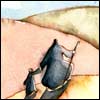In Hebrew man has four distinct names: adam, ish, enosh, and gever. Each of these terms describes a special virtue of man, and a failing.
Adam refers to a man of wisdom and understanding; ish is descriptive of moral, emotive attributes; 1 enosh signifies weakness in either intellect or emotions; gever denotes strength and mastery over obstacles, either in the realm of the intellect or of the emotions, whether or not the strength is innate or acquired.
Adam is the loftiest adjective, that of intellectual capacity. Through this trait a person, striving with mind and heart, achieves superiority over all Creation, not only over terrestrial creatures, but even over spiritual ones, such as the ministering angels and emanations. 2 Though the angels (on high) are Abstract Intellects3 (despite their bodily existence)-since their conceptions are non-spatial and non-temporal, while those of humans are circumscribed by the limitations of time and space-still man is superior. For only man has been given the mission and ability to illumine the darkness of this physical world with the light of Torah and mitzvot, to make it a G‑dly abode. 4 The Abstract Intellects lack this ability. Moreover, they cannot even conceive that physical objects can serve as an abode for the Divine Majesty, or that a physical brain can conceive of G‑d.
Man alone was chosen by G‑d for this task. Therefore he is called the principal creature. He has no parallel among the higher or lower creatures. Indeed, since he is composed of the loftiest and the lowest components (his body being formed from the lowest gross matter-dust of the earth, and his soul from the highest of all-part of G‑d above) 5 man with his physical brain can grasp G‑dly concepts even more thoroughly than can the angels. 6 This dual composition of man, makes him superior to the heavenly creatures.





